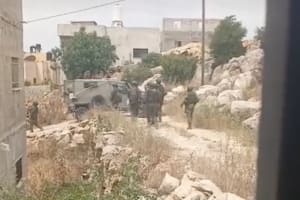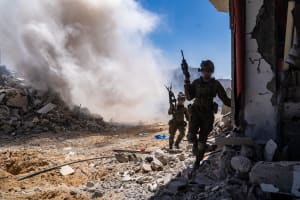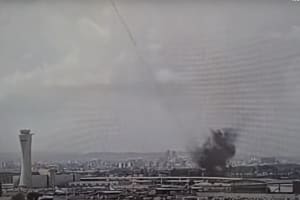Israel launches largest military exercise amid terror wave
The "Chariots of Fire" four-week drill will simulate war by air, sea, land and cyberfront and will involve all units of the Israeli army

The Israel Defense Forces is launching “Chariots of Fire,” the largest military exercise in the Jewish state’s history. The drill will last for a month and will simulate a multidimensional operation involving the Israel Air Force, the navy and military intelligence, as well as regular and reserve ground forces.
The four-week drill will simulate a multi-front war against Israel's enemies in the air, at sea, on land and on the cyberfront.
The training drill was originally planned for 2021 but was postponed due to the 11-day conflict with Hamas in Gaza in May 2021. The large-scale exercise takes place amid a terror wave that has already claimed at least 18 lives in Israel.
The purpose of the military exercise is to strengthen the Israeli army’s capabilities and readiness for a potential war with one or several of the Jewish state’s adversaries.
Brig -Gen. Ran Kochav, who serves as the IDF Spokesman, stressed that the drill will essentially involve all units of the Israeli army.
“There won’t be a unit that doesn’t take part in this drill,” said Kochavi.
Chariots of Fire will take place amid Operation Break the Wave, an ongoing military-police operation that seeks to stop the current terror wave sweeping across Israel.
“Along with the exercise, the IDF’s paramount mission is to protect the security of the citizens of the State of Israel. IDF Forces will continue to carry out offensive activities to thwart terrorism and will work to strengthen the defenses along the Seam Line as part of Operation Break the Wave,” the Israeli military said in an official statement.
While Israel has vowed to stop the current terror wave, the government is divided concerning its response. Prime Minister Naftali Bennett, who represents the conservative voter-base, is reportedly in favor of launching a larger military operation against Hamas in the Gaza Strip. By contrast, the centrist Israel’s Defense Minister Benny Gantz favors a more limited operation, focusing on the West Bank city Jenin, which is known as a hotbed for significant terrorist activities against Israel. Terrorists hailing from the Jenin area carried out several of the recent deadly terror attacks against Israeli civilians. Shin Bet, Israel’s internal security agency, appears to embrace the more limited approach suggested by Gantz.
There has been speculation in recent days that Israel is considering resuming targeted killing operations against senior Hamas commanders, including Hamas’ Gaza chief, Yahya Sinwar. While Hamas has been strengthened by the recent violence, the IDF has assessed that the organization is not behind the current terror attacks against the Jewish state.
Despite burgeoning Arab-Israeli peaceful regional cooperation, Israel still faces complex security challenges with the Hezbollah threat in the north and Hamas threatening the south. The common denominator is the Iranian ayatollah regime, which supports numerous terrorist proxies in its ideological war against the Jewish state’s existence.
In the meantime, it appears some adversaries of the Jewish state are carefully watching the large-scale Israeli military drill.
The Lebanese newspaper, Elnashra, reported that the powerful terrorist organization Hezbollah responded by raising its alert level to the highest level it’s been since it attacked northern Israel in 2006 during the Second Lebanon War. That war lasted for a month and claimed the lives of approximately 120 Israeli soldiers. Authorities estimate that between 600 and 800 Hezbollah fighters were killed or wounded in the conflict. The war also resulted in considerable civilian casualties and material damages on both sides of the border.
Despite ongoing tensions, the Lebanon-Israel border has remained largely quiet since 2006. During that time, however, Hezbollah has quietly built a vast rocket arsenal consisting of over 130,000 rockets which are able to reach any location inside the Jewish state. Hezbollah has also gained valuable combat experience through its operations inside neighboring Syria.
At the same time, Israel has dramatically improved its offensive and defensive capabilities over the last 15 years. While Hezbollah remains a serious threat, Israeli officials do not believe that the Iranian-backed Lebanese terrorist militia is currently interested in a large-scale confrontation with Israel.
Nonetheless, Hezbollah’s rhetoric remains toxic and menacing toward the Jewish state. In April, Mohammad Raad, the head of Hezbollah’s political bloc in the Lebanese parliament, boastfully claimed that Israel could be destroyed at a cost of $9 billion.

The All Israel News Staff is a team of journalists in Israel.













